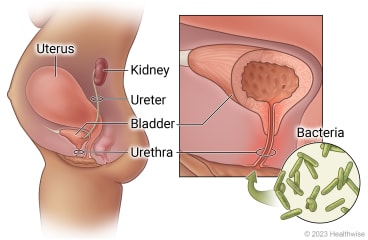
Overview
A urinary tract infection (UTI) is an infection caused by bacteria. It can happen anywhere in the urinary tract. A UTI can happen in the:
- Kidneys.
- Ureters, the tubes that connect the kidneys to the bladder.
- Bladder.
- Urethra, where the urine comes out.
UTIs are common in pregnancy.
Most UTIs are infections in the bladder. They often cause pain or burning when you urinate. An untreated UTI could lead to more serious problems such as preterm labor.
Most UTIs can be cured with antibiotics. Your doctor will prescribe an antibiotic that is safe during pregnancy. Be sure to finish your medicine so that the infection doesn't spread.
Follow-up care is a key part of your treatment and safety. Be sure to make and go to all appointments, and call your doctor if you are having problems. It's also a good idea to know your test results and keep a list of the medicines you take.
How can you care for yourself at home?
- Take your antibiotics as directed. Do not stop taking them just because you feel better. You need to take the full course of antibiotics.
- Drink extra water and other fluids for the next day or two. This will help wash out the bacteria causing the infection. If you have kidney, heart, or liver disease and have to limit fluids, talk with your doctor before you increase the amount of fluids you drink.
- Urinate often. Try to empty your bladder each time.
Preventing UTIs
- Drink plenty of fluids. This helps you urinate often, which clears bacteria from your system. If you have kidney, heart, or liver disease and have to limit fluids, talk with your doctor before you increase the amount of fluids you drink.
- Urinate when you first have the urge.
- Urinate right after you have sex.
- When going to the bathroom, wipe from front to back to keep bacteria from entering the vagina or urethra.
When should you call for help?
Call your doctor now or seek immediate medical care if:
- You have new symptoms of a urinary tract infection or your symptoms get worse. These may include:
- Pain or burning when you urinate.
- A frequent need to urinate without being able to pass much urine.
- Pain in the flank, which is just below the rib cage and above the waist on either side of the back.
- Blood in your urine.
- A fever.
- Nausea and vomiting.
Watch closely for changes in your health, and be sure to contact your doctor if:
- You do not get better as expected.
Where can you learn more?
Go to http://www.healthwise.net/patientEd
Enter M982 in the search box to learn more about "Urinary Tract Infection in Pregnancy: Care Instructions".
Current as of: July 10, 2023
Author: Healthwise Staff
Clinical Review Board
All Healthwise education is reviewed by a team that includes physicians, nurses, advanced practitioners, registered dieticians, and other healthcare professionals.

